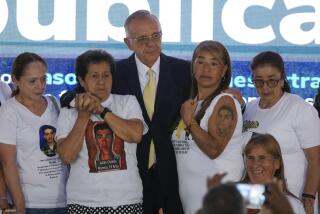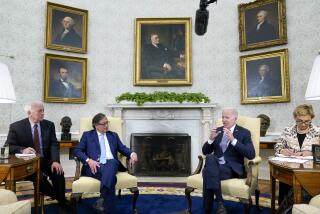Colombia Reaches Pact to Resume Peace Talks
- Share via
LOS POZOS, Colombia — With this country’s peace process hanging by a thread, President Andres Pastrana emerged Friday from two days of meetings with the most powerful rebel chief to present a broad but vague agreement to resuscitate talks.
At a joint news conference, Pastrana and reclusive guerrilla leader Manuel Marulanda outlined a face-saving accord guaranteeing the resumption of peace talks after a two-month rupture. Marulanda’s group, the Revolutionary Armed Forces of Colombia, or FARC, had been absent from talks since November, when its leaders “froze” dialogue to protest what they saw as the government’s laissez-faire attitude toward ultra-right paramilitary death squads plaguing the countryside.
Pastrana also said he would extend the duration of a southern demilitarized zone that he ceded to the FARC as a haven in 1998--the same rebel stronghold where his talks with Marulanda took place. In a dramatic gesture, the president brought only five guards with him, in effect placing his security in the hands of hundreds of young FARC fighters who milled around the meeting place with assault rifles hanging from their shoulders.
Friday’s accord saved the peace process from disintegration, but it fell short of providing concrete solutions to lessen the intensity of Colombia’s decades-old civil conflict. And it is unlikely to soften criticism from war-weary citizens who say that the government has failed to extract a single concession from the FARC since talks began two years ago.
“Today, the peace process has been revived,” Pastrana told reporters. Sitting next to each other in plastic chairs, the president and Marulanda outlined a 13-point communique calling for negotiators to rejoin talks Wednesday. They also agreed to discuss two thorny topics: ways to curb paramilitary violence and ways to “humanize” Colombia’s conflict.
Ideally, the latter would include promises from the FARC to curtail kidnappings and to cease hostilities. Negotiators have yet to touch on such delicate topics.
“The idea of a cease-fire is very complex. It’s not as easy as saying, ‘Let’s stop shooting,’ ” said the government’s peace negotiator, Camilo Gomez.
The zone’s extension was welcome news for the area’s 100,000 residents, who now share their pool halls, shops and hospitals with thousands of FARC fighters. Locals fear that if the peace process collapses they will be labeled rebel sympathizers and targeted by right-wing death squads.
“People are very tense. They’re worried about the risk that one day the zone will end and the paramilitaries will come to raze it,” said Dr. Luis Felipe Cardenas, a physician at the region’s single-story hospital.
Cardenas said that when he travels outside the rebel zone he usually doesn’t disclose where he lives. And when he suspects that his patients are suffering from stress-related illnesses, he asks them if they’re worried about the peace talks.
Although Pastrana was able to buy more time for the peace process, it remained unclear whether the accord will generate optimism among ordinary Colombians.
“The country is becoming polarized in a dramatic fashion, and two or three isolated gestures are not enough to stop it,” said Fernando Giraldo, a political analyst from Javeriana University in Bogota, the capital.
Pastrana and Marulanda said negotiators will continue to discuss a potential exchange of 10 ailing military and police prisoners held by the FARC for 10 imprisoned rebels who are also unwell.
The FARC holds 470 government troops, most captured in attacks on remote hamlets. State prisons, meanwhile, hold nearly 500 rebels.
Mothers of captured police officers have led a crusade to pressure both sides into some sort of swap. For these women--and their husbands--the accord brought some hope but did not end their uncertainty.
Hector Rodriguez, the father of one police officer held by the FARC, said: “You go to sleep thinking of this. You wake up thinking of this. You think of this at work. When there are holidays, you don’t realize it, because for you, every day is the same.”
More to Read
Sign up for Essential California
The most important California stories and recommendations in your inbox every morning.
You may occasionally receive promotional content from the Los Angeles Times.










